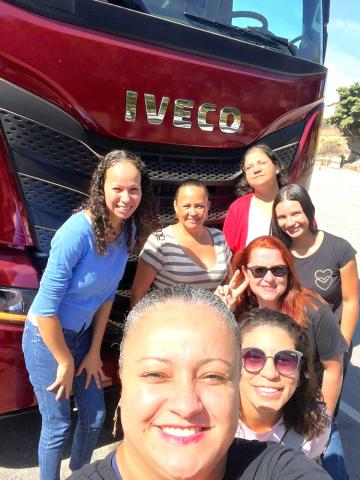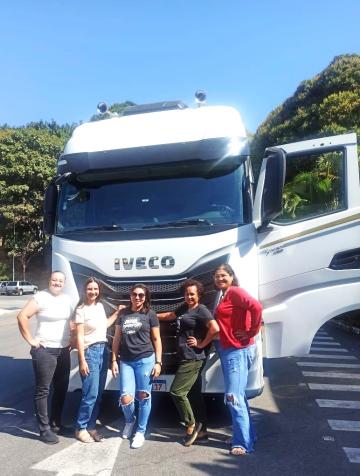Why aren’t more Brazilian women benefiting from the truck driving profession? IVECO is working to change this with Caminhos para Elas. More than half of the women who participated in the programme's first year have already secured employment.
In Brazil, women make up just 3.4% of licensed heavy-duty vehicle drivers. IRU member IVECO's Caminhos para Elas is a game-changing initiative aimed at increasing female participation in the sector.
We asked Marcio Querichelli, President of IVECO Latin America, to walk us through the programme and its achievements during its first year.
Why did you launch Caminhos para Elas?
Caminhos para Elas seeks to promote gender equity in the road transport sector. Many licensed women face obstacles such as a lack of job opportunities and the need for prior experience, preventing them from securing their first job as truck drivers.
With Caminhos para Elas, IVECO is opening doors, providing training, and creating real opportunities for more women to take control over their future in transport.
The programme also helps address a key challenge facing the sector: the shortage of drivers in Brazil. By encouraging female participation, we help meet this demand with skilled and dedicated professionals.
Caminhos para Elas is more than just a programme: it’s a movement by IVECO to transform transport into a more inclusive, diverse and accessible space.
How does it work?
The project was launched in 2024 in partnership with SEST SENAT, an institution dedicated to training professionals in the transport sector. Together, we have developed a specialised course for women.
We recognise that, beyond the common challenges of the profession, women face additional barriers. The course was tailored to include the development of essential skills such as self-confidence and empowerment. The classes are exclusively for women, promoting support and collaborative learning.
Participants also have the opportunity to learn from an experienced female truck driver who shares valuable insights and advice on overcoming the challenges of being a woman on the road.
They also receive hands-on driving training with the IVECO S-Way, gaining real-world experience and better preparing them for the job market.
How do you measure the project’s impact?
The first key result is the percentage of programme participants hired in the market. Another important metric is the participation rate in gender equity panels within the transport sector.

In 2025, we will also track and measure resumes submitted through “Vitrine para Elas”, an online platform that will function as a CV bank where participants can create a professional profile via LinkedIn, which is widely used by transport companies. This will directly link the Caminhos para Elas programme and LinkedIn, encouraging female drivers to strengthen their online presence and participation in the transport job market.
How has the project fared so far?
During its first year (2024), 60% of the women who were trained found employment. Events were held in São Paulo, Contagem and Curitiba, bringing together around 200 participants to discuss gender equality and encourage companies to hire and retain female drivers.
In addition, transport companies that hired female drivers reported benefits such as improved fuel efficiency, reduced maintenance needs, and fewer traffic violations.
One of the participants, Cíntia Rocha, a truck driver from Contagem, saw the programme as a chance to advance in her career and become a role model for other women. She highlighted the training’s value and its positive impact on her career. For female professionals, feeling motivated and knowing they're not alone in facing industry challenges is key to career growth.
How are female truck drivers perceived in Brazil?
The Brazilian truck driver market remains a very male-oriented environment, as the rates show. Several factors contribute to this reality, including cultural aspects, such as history – as it has traditionally been a male occupation for decades – as well as structural challenges like the lack of female restrooms, adequate rest areas, and flexible shifts for mothers. These barriers make it more difficult for women to enter the profession and undermine retention.
Caminhos para Elas aims to open new opportunities, transform the industry, and raise awareness about the challenges of hiring and retaining women.
In 2024, we organised three gender equity panels, bringing together transport companies, clients, suppliers, unions, and associations. We also launched a blog to share case studies on diversity, equity and inclusion practices in transport to inspire change.
What’s stopping women from becoming truck drivers?

Women who aspire to become truck drivers in Brazil face numerous challenges, including:
- Cultural aspects – As mentioned, the road freight sector is still predominantly male. Many women encounter scepticism and discrimination when trying to establish themselves in the field.
- Road infrastructure – The lack of safe and well-equipped support points tailored to women's needs, such as proper restrooms and rest areas, presents a major challenge for those pursuing this career.
- Work-life balance challenges – Long-haul routes can be a barrier, especially for women who also have family responsibilities.
- Limited representation and support networks – The absence of other women in the profession and the lack of a strong support network make the journey even more difficult, leading many to give up before even getting started.
Who have you partnered with for this programme?
Our partners play a vital role in reshaping the industry and promoting diversity, equity and inclusion in transport. Their support is key to advancing public policies that address the challenges faced by women. We are currently supported by the National Transport Council in Brazil and other transport organisations that are actively connecting women to job opportunities.
We also count on the invaluable support of our network of dealerships, clients and suppliers. They are implementing inclusive policies and reviewing their hiring processes to create more opportunities for women to gain driving experience and establish themselves in the market. This is an important first step!
Does IVECO have similar initiatives in other countries?
In the city of Córdoba, Argentina, there is a project that aims to promote inclusion and diversity in the transport sector by assigning women drivers to drive urban buses. Specialised training for drivers is carried out by the IVECO Academy, our training centre created for the development of professionals in Latin America.
Regarding Caminhos pra Elas, we are currently starting the second edition of the programme in Brazil. We are gaining more experience and strength, continuously improving our initiatives. With these advancements, we aim to reach out to partners in Argentina to develop a similar programme there.
About IVECO
IVECO designs, manufactures and markets a wide range of light, medium and heavy commercial vehicles, off-road trucks and vehicles suitable for any body type. It constantly innovates and extends its product portfolio to provide every customer with the vehicle that matches their mission precisely.
IVECO’s full-line offer is designed around the Driver’s needs to ensure an excellent experience with a focus on safety and comfort. A wide range of advanced digital, connectivity-enabled services developed to help fleet owners run their fleet efficiently enhance IVECO’s complete transport solution.
IVECO pursues its decarbonisation strategy through a multi-energy approach that includes the further development of HVO, bio-methane, battery-electric and hydrogen.
